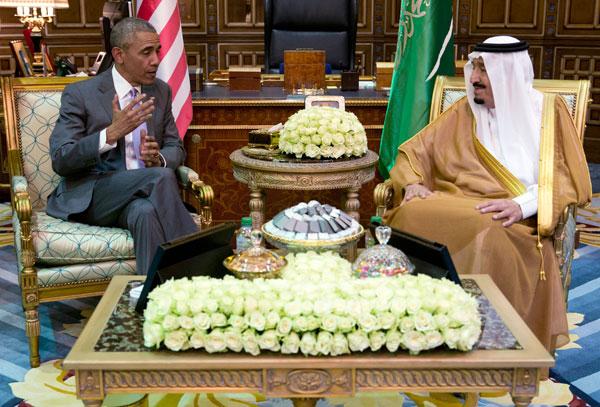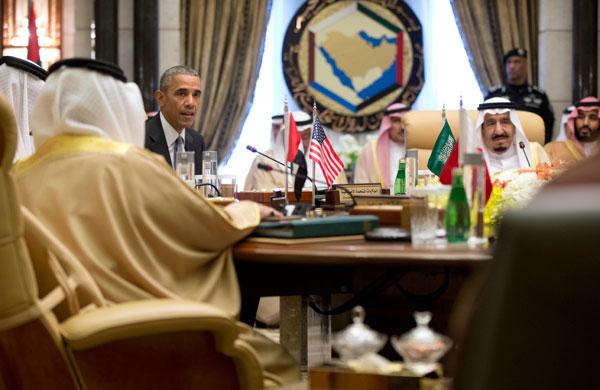You are here
Obama in S. Arabia as changes test old alliance
By AFP - Mar 27,2014 - Last updated at Mar 27,2014
ROME — US President Barack Obama will aim Friday to reassure his Saudi hosts on the strength of their alliance, frayed by Washington’s diplomatic opening towards Iran and reluctance to use force in Syria.
Obama is expected late on Friday in oil-rich Saudi Arabia, the fourth and final stop of a tour this week after the Netherlands, Belgium and Italy.
The White House was late to announce Obama’s stop in Riyadh, following his European tour, fuelling speculation on the motives of the US president’s second visit since his election in 2009 to Washington’s decades-old ally in the Middle East.
Dating back to the end of World War II, the relationship was founded on an agreement for Washington to defend the Gulf state in exchange for oil contracts.
OPEC kingpin Saudi Arabia is the world’s top producer and exporter of oil. In 2012, it was still the second largest exporter to the United States, after Canada.
But relations have soured, with Riyadh openly criticising US policy on regional issues, which are to be discussed at a meeting followed by dinner between King Abdullah and Obama.
At the Arab League summit in Kuwait on Tuesday, Saudi Crown Prince Salman Bin Abdulaziz accused the international community of “betraying” Syrian rebels, outgunned in their war against President Bashar Assad’s regime.
According to the Syrian opposition, Washington has imposed a veto on its allies against arming rebels with anti-aircraft and anti-tank weapons, over fears they could fall into the hands of Islamist extremists.
And the Saudis were bitterly disappointed by Obama’s 11th-hour decision last year to back down from military action against the Syrian regime over chemical weapons attacks.
Saudi Arabia, long wary of Iran’s regional ambitions, is also sceptical of the interim nuclear deal reached by world powers and the Islamic republic in November, viewing it as a risky venture that could embolden Tehran.
The agreement would curb Iran’s controversial nuclear activities in exchange for limited sanctions relief, and is aimed at buying time to negotiate a comprehensive accord.
Regional turmoil tests ties
Sunni-dominated Saudi Arabia and Shiite Iran have long been rivals, with the two heavyweights vying for leadership of the region.
And with the geopolitical turmoil caused by the Arab Spring since 2011, the two Gulf neighbours have taken opposing stances on conflicts across the region.
The Saudis responded warily to Obama’s support of protests that overthrew authoritarian regimes, especially Egypt’s uprising which ousted former strongman Hosni Mubarak, a staunch US and Saudi ally.
The kingdom was dismayed by the partial freezing of US aid to Egypt, whose army toppled Islamist president Mohamed Morsi in July — a move hailed by Saudi Arabia.
“I think actually the underlying anxiety and the sort of demand for Washington’s attention from the Gulf... comes from the fact that we are at a bit of a turning point in terms of America’s role in the region,” said Tamara Cofman Wittes, a Middle East specialist with the Brookings Institution in Washington.
She cited the ongoing US military withdrawal from Afghanistan, after Iraq.
With Obama’s announced goal of North American energy independence in the medium-term, “a lot of people in the region, I think, are naturally asking themselves what America’s energy independence means for America’s willingness to invest in the security of energy and supply from the Gulf”, said Wittes.
Obama’s visit also comes at a time of rifts within the Saudi-led Gulf Cooperation Council over Qatar’s alleged interference in their internal affairs and its support for Morsi’s Muslim Brotherhood.
According to the Wall Street Journal, the crisis put on hold US hopes for a summit between Obama and leaders of the six-nation GCC.
But the White House denied a formal meeting was scheduled.
It was only “something that we had contemplated some weeks back and began some preliminary consultations on”, according to National Security Adviser Susan Rice.
“While we maintain very strong and cooperative relationships with each of the GCC countries, we didn’t think that from their point of view that the time was optimal for a collective meeting,” she said.
Related Articles
RIYADH — US President Barack Obama met Saudi Arabia's King Salman on Wednesday to seek joint action on security threats including Iran and t
RIYADH — The United States will deter and confront aggression against Gulf Arab monarchies, who continue to have concerns about threats from
Long-standing ties between the United States, the world’s oldest democracy, and Saudi Arabia, an ultra-conservative Islamic absolute monarchy, have strained at times, but the unlikely allies remain bound by mutual interests in regional stability and oil.

















